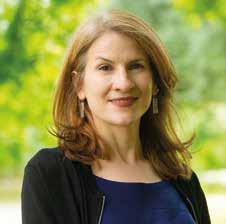
2 minute read
Life after the Daphne Jackson Trust Fellowship

Dr Lisa Mohebati, University of Surrey
Advertisement
It was time for a new adventure. I had my Nutrition Society funded Daphne Jackson Fellowship and a publication under my belt and was ready for the next step in my return to science after a career break. I was avidly exploring grant and job opportunities, and to my sons’ delight there was a position advertised for a nutritionist at a Premier League football club. I am open-minded and up for challenges, but at this stage I thought someone else might be better suited to travelling with the team.
In terms of options, nutrition is an amazing field. It offers such a variety of avenues of work and is of interest not only to athletes, researchers, scientists, health professionals, policy makers and many others but also to regular people on the street. Mostly everyone is happy to talk about food because everyone can relate to it. It is a vital issue, part of our day-to-day lives, our social interactions, our culture, our health and well-being; it goes beyond ourselves, our families and friends, affecting many others and their livelihoods in different communities and countries, as well as the Earth itself.
So, where next? I had really enjoyed the encouraging, supportive environment
Obituary
of the Food, Consumer Behaviour and Health Research Centre (FCBH) and the Nutrition Department at the University of Surrey where I was situated during my Fellowship, even though my research seemed very different to that of my colleagues. When a position with the European Union funded COMFOCUS project with FCBH was advertised I applied. I was eager to expand my horizons but wondered how previous experience in public health and expertise in maternal-infant feeding interactions could effectively contribute to advance the cohesion of the European food consumer science community? Fortunately, I was given the opportunity to find out.
Food consumer science looks at what drives food choices and how these can be influenced to promote increased well-being. It draws on psychology, marketing, sciences related to food and food systems as well as nutrition. My research skills and thirst for knowledge have been serving me well in my new position and I have enjoyed learning more about how food choice, so critical to nutrition outcomes, affects and is affected by such a wide variety of factors. The opportunity to collaborate with a large consortium of researchers from a variety of disciplines, backgrounds and nationalities is also proving to be an enriching experience.
I have also been fortunate to continue pursuing my research interest in infant feeding, by developing a grant with parents, researchers and practitioners to co-design and pilot test a nutritional component for an existing evidencebased parenting programme. Should the grant and project be successful, I am hopeful it will have a positive impact on the lives of many parents and infants.
None of this would have been possible if organisations, such as the Daphne Jackson Trust, The Nutrition Society and the University of Surrey, alongside supportive mentors I have encountered during my journey, had not believed in the potential of people like me to return to science after a career break. There are many more out there whom I sincerely hope will come across a valuable opportunity like this and seize it with determination.
Miss Jean Marr
Obe
It is with deep sadness that we announce the recent, and unexpected death of Miss Jean Marr OBE. Miss Marr was a past president of the Committee of Associations of Dietitians in the European Community (CADEC) from 1978 until 1982, Honorary Chairman of the British Dietetic Association (1966-7) and was also elected a fellow of the BDA (1979). As a stalwart Member of The Nutrition Society since the 1950’s, Miss Marr was informed earlier this year of her nomination to receive a Special 80th Anniversary Award for her significant contributions to the Society.



